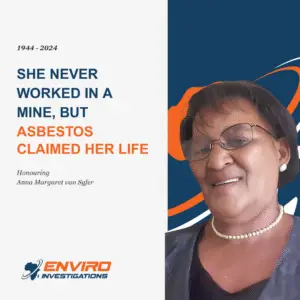Misdiagnosis Crisis: Asbestos Illnesses Mistaken for Tuberculosis in South Africa
In South Africa, a troubling trend has emerged in the healthcare system: individuals suffering from asbestos-related illnesses are frequently misdiagnosed with tuberculosis (TB). This issue is particularly severe in regions like the Northern Cape, where the legacy of asbestos mining coincides with high TB rates, creating a diagnostic challenge with devastating consequences for patients.
The Overlap Between Asbestos Diseases and TB
Asbestos-related illnesses, such as asbestosis and mesothelioma, share several symptoms with tuberculosis, including:
- Chronic coughing
- Chest pain
- Shortness of breath
- Fatigue
- Weight loss
These shared symptoms make it difficult for under-resourced healthcare facilities to differentiate between the two conditions. Compounding the problem is South Africa’s high prevalence of TB, which often leads healthcare providers to default to a TB diagnosis when confronted with respiratory symptoms.
Consequences of Misdiagnosis
The misdiagnosis of asbestos illnesses as TB has severe and far-reaching effects:
- Delayed Proper Treatment: Patients do not receive the specialized care required for asbestos-related diseases, leading to the progression of their condition.
- Unnecessary TB Treatment: Misdiagnosed individuals often endure long courses of TB medication, which come with harmful side effects and no benefit for their actual illness.
- Increased Financial Burden: Many patients, particularly in rural areas, struggle to afford repeated healthcare visits and unnecessary TB treatments.
- Emotional and Psychological Impact: A TB diagnosis can lead to social stigma, isolation, and significant emotional distress for both patients and their families.
- Underreporting of Asbestos Illnesses: Misdiagnosis obscures the true prevalence of asbestos-related diseases, hindering public health efforts to address the crisis.
Why Misdiagnosis Happens
Several factors contribute to this widespread misdiagnosis:
- Limited Access to Diagnostic Tools: Advanced imaging and pathology tests necessary for accurately diagnosing asbestos-related diseases are often unavailable in many healthcare facilities.
- Overburdened Healthcare System: South Africa’s public health system is under significant strain, with limited resources and time for thorough patient evaluations.
- Lack of Awareness: Many healthcare providers lack training in recognizing asbestos-related illnesses, especially in regions with a history of asbestos mining.
- TB Epidemic: South Africa’s high TB burden often leads to a bias toward diagnosing TB as the primary explanation for respiratory symptoms.
Steps to Address the Issue
Tackling this misdiagnosis crisis requires a comprehensive approach:
- Healthcare Provider Training: Educating medical professionals about the symptoms and risks of asbestos-related illnesses, particularly in high-risk areas.
- Improved Diagnostic Infrastructure: Expanding access to advanced diagnostic tools in rural and underserved areas, such as CT scans and biopsies.
- Community Awareness Campaigns: Inform communities about the dangers of asbestos exposure and encourage patients to seek second opinions if they suspect misdiagnosis.
- Policy and Funding Support: Governments and NGOs must prioritize funding and policies to enhance the accurate diagnosis and treatment of asbestos-related diseases.
- Data Collection and Research: Conducting studies to understand the prevalence of asbestos illnesses and their misdiagnosis rates more accurately.
A Call for Action
The misdiagnosis of asbestos-related illnesses such as TB is a critical failure of South Africa’s healthcare system. It not only denies patients the care they desperately need but also obscures the true impact of asbestos exposure on public health. Addressing this crisis demands immediate action from healthcare providers, policymakers, and advocacy groups.
For individuals and families affected by this issue, seeking a second opinion and advocating for comprehensive diagnostic testing can be life-saving. Public awareness and robust healthcare reforms are essential to bringing this silent crisis into the spotlight and ensuring those suffering receive the care and support they deserve.




